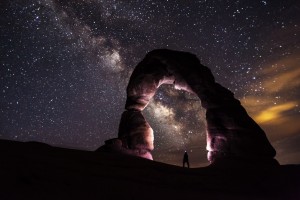U.S. Park Rangers are trained to work in extreme and dangerous environments, in deserts void of human touch and uncivilized wildernesses, among mindless beasts and insects. So they are prepared—or at least better prepared than most of us—to operate at the fearsome intersection of federal bureaucracy and the oil industry.
A group of retired rangers have formed Park Rangers for our Lands (PROL), an advocacy group “to inform people about the threat National Parks are under from the impacts of oil and gas drilling, and urge the federal government to adopt a more balanced approach to drilling.”
As we noted back in September, “12 U.S. national parks already contain active fossil fuel extraction operations. And the National Park Service has prepared a list of another 30 where drilling is a good possibility.”
For now, the risk for parks seems to be less from in-park drilling and more from the lease of adjoining land controlled by the Bureau of Land Management or private owners. Case in point: in March, one exploration company submitted a request to drill within 100 feet of Theodore Roosevelt National Park. (After a public outcry, the proposal was withdrawn.) Another case in point: the Colorado Bureau of Land Management has proposed oil and gas projects, including one that PROL says is one “across the street” from Dinosaur National Monument’s southern entrance and “next to the visitor center.” After public outcry, the leases have been deferred.
National Parks Traveller says that PROL’s leader, Ellis Richard, and a “handful” of former rangers are hoping to make the public aware of what development means—in visual and air pollution—before families start pitching their tents under a cloud of particulates. In some cases, they’re late. “At Mesa Verde, he notes that the park already is facing severe air-quality issues due to both drilling operations and coal burning power plants in the Southwest.”
PROL’s website also identifies risks to several other national parks, including Arches, Canyonlands and the new Pinnacles (details here).
The rangers aren’t alone in this. The National Parks Conservation Association has issued its own study of fracking and the parks.
Clearly, fracking is a juggernaut. It promises cheap fuel (recent gas price increases notwithstanding), jobs and energy independence. Also, lots more CO2 in the atmosphere. Because of fracking, we are a nation awash in oil and gas. Much of the extraction is out of sight, in what the NPCA study calls “remote, rural locations inhabited (and visited) by few people.”
Let’s keep it that way.
Photo: Arches National Park, NPS photo by Jacob W. Frank










